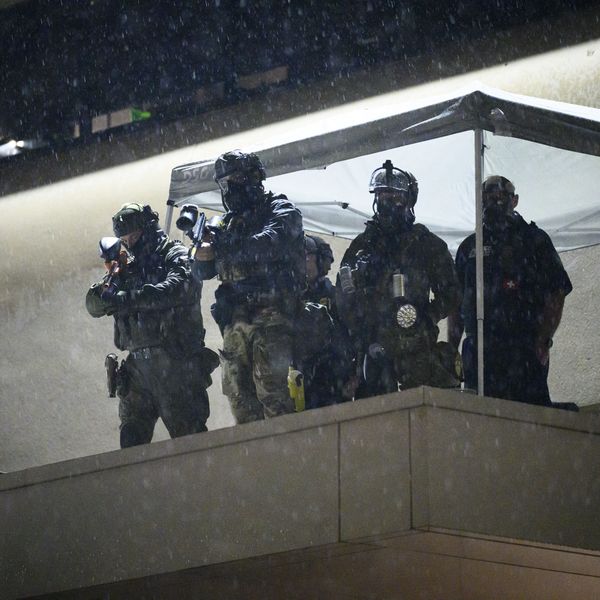WASHINGTON - Hopes that the strategy announced by President Barack Obama a month ago against the Islamic State of Syria and the Levant (ISIL) might yield a relatively quick victory have disappeared amidst growing fears that the U.S.-led air campaign has at most only slowed the radical group's advance.
While air strikes, combined with ground attacks by Iranian-backed Kurdish peshmerga and Iraqi Special Forces, succeeded initially in pushing back militants of the self-described Islamic State, from positions close to Erbil and from their control of the Mosul Dam and more recently in taking back the Rabia and Daquq districts in the north, U.S. air power has failed to prevent ISIL from taking most of the Kurdish town of Kobani on the Syrian Turkish border as of Monday.
"It's definitely boots in the air. This is combat, assuming U.S. Army guys were flying the helicopters. Using helicopter gunships in combat operations means those forces are in combat."
--Jeffrey White, Washington Institute for Near East Policy
Even more worrisome here have been ISIL advances in the so-called Sunni Triangle on the eastern edge of Al-Anbar province in Iraq.
In a significant escalation of Washington's direct involvement in the fighting, the U.S. Central Command (CentCom) announced Sunday that it had sent attack helicopters into battle against ISIL positions just west of Baghdad.
"It's definitely boots in the air," Jeffrey White, a veteran military analyst at the Washington Institute for Near East Policy (WINEP), told McClatchy Newspapers.
"Using helicopter gunships in combat operations means those forces are in combat," he noted, adding that the resort to slower-moving and low-flying aircraft posed a much greater threat of U.S. casualties and an implicit recognition that air strikes so far had failed to stop ISIL forces from launching offensive operations.
ISIL forces also appear to have taken control of Abu Ghraib, the Baghdad suburb made infamous by abuses committed at a prison there by U.S. troops against Iraqi detainees during Washington's occupation.
More than one commentator has noted that Baghdad's International Airport, which hosts a U.S. command centre and aircraft, including helicopter gunships, is now within range of artillery and rockets - considerable quantities of which ISIL captured from military bases abandoned by Iraqi forces earlier this summer -- fired from the town.
In recent days, ISIL forces also successfully took control of two key towns - Kubaisa and Hit -- west of Anbar's capital, Ramadi, in an apparent bid to consolidate their hold on the province and gain control over key oil pipeline. Their advances have also isolated several Iraqi military bases that may now prove more difficult to supply.
Obama, who has repeatedly promised not to send ground troops to fight in either Syria or Iraq since he announced the first deployments of what now numbers approximately 1,600 U.S. trainers and advisers to Iraq in the wake of ISIL's summer offensive, been under persistent pressure from hawks, especially Congressional Republicans, and even some of his former senior Pentagon officials, including Robert Gates, to reconsider.
"The reality is, they're not gonna be able to be successful against ISIS strictly from the air, or strictly depending on the Iraqi forces, or the Peshmerga, or the Sunni tribes acting on their own," Gates warned in mid-September.
"So there will be boots on the ground if there's to be any hope of success in the strategy. And I think that by continuing to repeat that [the U.S. won't put boots on the ground], the president, in effect, traps himself."
Even Obama's own top military commander, Joint Chiefs of Staff chairman Gen. Martin Dempsey, has suggested that Washington may need Special Forces on the ground in Iraq, at least to act as spotters for U.S. and allied aircraft to hit ISIS targets more precisely, if not in a more aggressive role in hunting down key ISIS leaders, as they have done against enemy forces previously Iraq and Afghanistan.
Some neo-conservatives have called for deploying as many as 25,000 U.S. Special Forces in Iraq and Syria, although recent polls have found that the public, even including many self-identified Republicans, tend to side with Obama in opposing any combat role for U.S. ground troops even as they support stronger action against ISIS.
Obama's strategy appears to rely on steadily degrading ISIS's military forces - especially the heavy weapons and transport vehicles it captured from the Syrian and Iraqi army -- through a U.S.-led air war with the substantial participation of Sunni Muslim states, notably Saudi Arabia and other Gulf Co-operation Council (GCC) members, and as many NATO allies as are willing, although none has yet agreed to take part in operations against ISIS targets in Syria.
U.S. warplanes have also struck oil refineries used by ISIS in Syria to deny the group a key source of income, part of a financial war that also includes exerting unprecedented pressure on GCC governments to crack down against their citizens and charities that have been supporting ISIS or Jabhat al-Nusra (JAN), al-Qaeda's closest affiliate in Syria.
Washington is pushing the Shi'a-led government of Iraqi Prime Minister Haider al-Abadi to follow through on plans to share more power with the Sunni community, in major part by training some 10,000 "national guard" troops recruited from key tribes to take on ISIS in Anbar and elsewhere in a replay of the so-called "Anbar Awakening" that isolated ISIS' predecessor, al-Qaeda in Iraq (AQI), in 2007-8.
That part of the strategy remains a work in progress, as Abadi has so far failed to gain a consensus for the key defence and interior portfolios, and, despite a few reports of Sunni tribal forces allying with Iranian-backed Shi'a militias and the Iraqi army against ISIS, most Sunni leaders continue to express skepticism about Abadi's intentions.
Even if all goes according to plan, including rebuilding the Iraqi army, a major portion of which collapsed in the face of ISIS's onslaught this summer, the U.S. commander chosen to co-ordinate the international coalition, Gen. John Allen, warned over the weekend that it will take at least a year for Iraqi forces to be ready to challenge ISIS's control over Mosul, Iraq's second-largest city, which it conquered in June.
One year will also be needed to train some 5,000 "moderate" Syrian recruits in Saudi Arabia and Georgia for war against ISIS, JAN, and the government of President Bashar al-Assad, according to administration officials who admit that such a force by itself is unlikely to substantially tilt the battlefield in one direction or another without the aggressive use of air power to defend it.
Already, however, Washington's air war in Syria has drawn heavy criticism from various Syrian factions from which the U.S. is expected to recruit the new force. They have opposed attacks against JAN, which has co-operated with them in their war against Assad. Strikes against ISIS in and around its stronghold at Raqqa have also reportedly killed civilians, alienating the population from the coalition.
Observers here are also concerned about Turkey, whose co-participation in the coalition in both Syria and Iraq is seen as critical to the strategy's success.
While President Recept Tayyip Erdogan last week persuaded parliament to authorize military operations in both countries, he has still not permitted Washington the use of strategically located air bases in southern Turkey to launch operations.
Moreover, while the Turkish last week re-inforced its presence along the border with Kobani last week, it failed to intervene against ISIS's offensive there and actively prevented Turkish Kurds from crossing the border to bolster the town's defences.
"For Turkey, the most dangerous fallout of the Syrian civil war has been the resurgence of the Kurdistan Workers' Party (PKK)" with which the Kurdish fighters - mostly members of the Democratic Union Party (PYD) in Kobani -- are allied, according to an analysis by Gonul Tol of the Middle East Institute published by CNN.
"Turkey believes that fighting the Assad regime is more important than the narrow counter-terrorism mission that President Obama has in mind. A military attack against ISIS is likely to strengthen not only Assad's but also the PYD's hand," she wrote.

